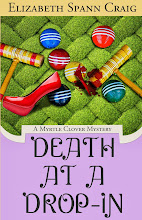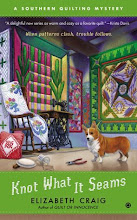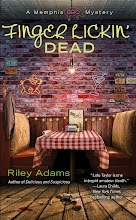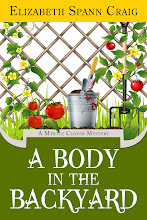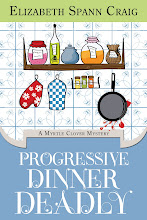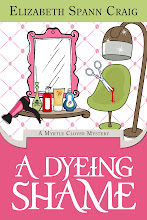
![Terry3_thumb[1] Terry3_thumb[1]](//lh3.ggpht.com/_v68WnMKHlKQ/TUTKuqlcfNI/AAAAAAAACR8/TyP-OeTYkMY/Terry3_thumb%5B1%5D_thumb%5B158%5D.png?imgmax=800)
Here are writing links that I’ve posted to Twitter for the past week.
I’m delighted that now we have an efficient method of locating resources on writing topics when you need them—via the Writer’s Knowledge Base search engine and software engineer and writer Mike Fleming’s ingenuity. The links I tweet (which are writers’ blogs, agents’ and editors’ blogs) all are added to the engine to make it easier for you to access the information you’re looking for.
Hope you’ll come back tomorrow when Mike talks a little about how he came up with the idea for the Writer’s Knowledge Base and how it works.
Why Write a Novel—Your Reason is the Right One: http://dld.bz/M5wn
What Kind of Writer Are You? Career Themes: http://dld.bz/M5wh
Setting, POV, Backstory & Characterization: http://dld.bz/M5wf
Style Sheets: A Tool for You and Your Critique Partners: http://dld.bz/Mmme
If You Build it, They Will Read: Plotting With Layers: http://dld.bz/M5vU
Top 5 Things Writers Should NOT Do: http://dld.bz/M5vN
Reasons why today's crime novelists should read the classics of the genre: http://dld.bz/MxHY @mkinberg
Honing your dark hero: http://dld.bz/MmkR #amwriting
Youth *can* enjoy verbal storytelling: http://dld.bz/Mj7k and http://dld.bz/Mj7m @kevincordi
Do lit mags have the same chance for survival as popular titles? http://dld.bz/Mjz4
Expose Your Writing Sins: http://dld.bz/KVqM
Myst. Lov. Kitchen: The Food of Love: Spaghetti and Meat(less) Balls http://bit.ly/hBosGb @CleoCoyle
One author's life in writing (Guardian): http://dld.bz/MmhG
10 Tips to Ensure a Productive Writing Day: http://dld.bz/Mjy4 @elspethwrites
The Ancient Editor Goes to Lunch: http://dld.bz/Mjyz
A Feedback Format for Critiques: http://dld.bz/Mmkx
Tips for Avoiding Crime Fiction "Road Hazards": http://dld.bz/MxH4 @mkinberg
Nice wrap-up--Creativity Tweets of the Week: http://dld.bz/Mu7N
An author with a POV Q&A: http://dld.bz/MxCe @authorterryo
Dialogue Tags: How to Kill Off Some Of The Little Buggers: http://dld.bz/MxYz @SharlaWrites
The 10 Essential Grammar Rules—of Life: http://dld.bz/Mu7E
4 tips to prepare for your book launch: http://dld.bz/Mxq2 @hopeclark
An agent's post: How to Get Published (The Definitive Post): http://dld.bz/Mu77
Using Advertising Lessons to Make Your Story: http://dld.bz/MxpW @hopeclark
Need tips for plotting? http://hiveword.com/wkb/search?q=plot #amwriting
10 Ways to Promote Your Book in Your Own Backyard: http://dld.bz/Mmkp
Computers vs. longhand--and an interesting study on the pros and cons of both approaches to writing: http://dld.bz/Mu6n
Coincidences in writing: http://dld.bz/Mmjf #amwriting
Six Steps for Approaching Potential Critique Partners: http://dld.bz/MmgR
Critique Groups as an Unreliable Narrator: http://dld.bz/MjxJ #amwriting
The Most Important Thing A Writer Can Do (Other Than Read And Write): http://dld.bz/MwpS @ajackwriting
When Hiring a Publicist Make a Real Connection: http://dld.bz/MjtG
10 great places freelance writers can find story ideas: http://dld.bz/Mjtk
How to Be a More Effective Author Online: http://dld.bz/MbU9
SFF and the Classical Past, Part 4—Legions of Gladiators: http://dld.bz/MjsH
Handling Your Word Count: http://dld.bz/MjsF
Fantasy Writer’s Use of History: http://dld.bz/MjrF
Talking about the novel you're working on: http://dld.bz/Mjqb #amwriting
The hero's journey: http://dld.bz/K8qS and http://dld.bz/K8rb
An editor's thoughts on pacing: http://dld.bz/K8q8
Improving Your Fiction: 246 Rules from 28 Modern Writers: http://dld.bz/KVqF #amwriting
Myst. Lov. Kitchen: Chocolate Covered Strawberries! http://bit.ly/gvLirS @CleoCoyle
Platform–Why We Need One: http://dld.bz/MehS
Does your story involve language change? Some tips: http://dld.bz/Mehn
Examples of Sensory Details in Writing: http://dld.bz/Mek6
A trend toward present tense in YA? http://dld.bz/Mekk
3 Things the Novelist Can Learn From the Copywriter: http://dld.bz/MejU
Don't Sweat the Small Stuff Week: Word Counts: http://dld.bz/MehK
Is your book's setting ho-hum? http://dld.bz/KNYg #amwriting
10 Reasons Novel Manuscripts Get Rejected: http://dld.bz/MehD
Query Writing Troubles? It Might Be The Story, NOT The Query: http://dld.bz/MegF #amwriting
Storytelling--tips for crafting a verbal story: http://dld.bz/Mjnt @kevincordi
Character habits and other identifiers: http://dld.bz/Mjmk #amwriting
10 ways to make editors fall in love with your work: http://dld.bz/Megp
Top 10 love poems, in time for Valentine's Day (Guardian) : http://dld.bz/Mjxe #amwriting
On business cards for writers: http://dld.bz/Meg5
What your agent doesn't want to hear you say: http://dld.bz/Megz #amwriting
Writers react to AOL-HuffPost deal: now what? http://dld.bz/Mefj
6 Fiction Writing Techniques to Improve Your Blog: http://dld.bz/Med7
An agent says, "It's not my job to be your BFF.": http://dld.bz/Mjv6 #amwriting @gatekeeperspost
7 Tips for Using Hyphens with Adjectives: http://dld.bz/Med6 #amwriting
Why Adverbs Will Really Probably Always Mostly Suck: http://dld.bz/MjnR @charissaweaks #amwriting
An agent explains remainders: http://dld.bz/Medv
A Storyteller dives into Digital: http://dld.bz/MjmK @KevinCordi
The Subconscious In Writing: http://dld.bz/Medn @joanswan #amwriting
10 ½ Tips for Being a More Effective Author Online: http://dld.bz/MbU9
Behind the Scenes with a Literary Agent: http://dld.bz/MbPA #amwriting
Character-Driven/Plot-Driven: http://dld.bz/K8qq #amwriting
Writer's Tools: Worksheets & More: http://dld.bz/cXmN #amwriting
Myst. Lov. Kitchen: Like Cheddar for Chocolate http://bit.ly/eDUj26 @CleoCoyle
Travel Writing Tips for Writers Who Can’t Write Description: http://dld.bz/MbP2 #amwriting
Using (Or, Preferably, Not Using) the Subjunctive Mode: http://dld.bz/MbPx
Urban Fantasy and the Elusive Male Protagonist: http://dld.bz/MbNY #amwriting
What Your Query Says About Your Book: http://dld.bz/KVet
Tips for switching POV characters: http://dld.bz/Menb @authorterryo
There are no original fairy tales: http://dld.bz/MbNd
SF Editors & Authors Discuss Future of Publishing: http://dld.bz/Mema
How to Start On Twitter (Or Open a 2nd Twitter Account) Without Looking Like a Newbie: http://dld.bz/MaAU
Can Book Critics and Authors be Friends? http://dld.bz/MaA3
Want to create vibrant characters that pop off the page? http://dld.bz/KNXX #amwriting
Lighten Up! Cutting Down Your Word Count: http://dld.bz/MaAx
Bulking Up: Fleshing Out a Too-Short Novel : http://dld.bz/Ma9B #amwriting
Thoughts on when to follow your beta readers' advice and when to follow your gut: http://dld.bz/MaNq
The Scene Conflict Worksheet - Developing Tension in Your Novel: http://dld.bz/KVpB
How To Avoid Becoming Another Boring Writer's Blog: http://dld.bz/Ma8P #amwriting
7 Ways to Attract Attention to Your Book Sales Page: http://dld.bz/MbM2 @victoriamixon @thecreativepenn #amwriting
Three Places Where You Should Tell Instead of Show: http://dld.bz/Ma8r #amwriting
Cutting Overwhelm Down To Size: http://dld.bz/Ma7T #amwriting
The Future of Agents: http://dld.bz/Ma7A #amwriting
Learning to write from fruit: http://dld.bz/KVpa
How to copy and paste your Kindle highlights and notes into a Word file or email: http://dld.bz/KZE5 @galleycat
To Produce & Protect: 5 Things That Creators Can Learn From IT Geeks: http://dld.bz/KVf4
Want More Copywriting Clients? Here’s a Surprising Way to Find Them: http://dld.bz/KVeM
Deciding When to Show and When to Tell: http://dld.bz/KUWM @4kidlit
One editor lists the marks of an amateur: http://dld.bz/K8qd
Shades of Gray: A Somewhat Liberating Spin on Story Structure: http://dld.bz/K8pk
The value of pausing for a critique: http://dld.bz/KNRj #amwriting
The Three Dimensions of Character Development: http://dld.bz/K8pa
Myst. Lov. Kitchen: A Valentine’s Day Cocktail http://bit.ly/eBOdOh @CleoCoyle
Working Together to Renovate Publishing–The WANA Plan: http://dld.bz/KNQV
10 Radical Ideas for Getting Kids to Read: http://dld.bz/KNPM
Listen to Full Audio of AWP Social Media Panel (Writer's Digest): http://dld.bz/KNQD #amwriting
Neuroscience for writers: http://dld.bz/KVkG
The Misleading "Research" By McSweeney's: http://dld.bz/KNQ2
A weekly roundup of informative agent tweets: http://dld.bz/KVhR @HeatherMcCorkle
10 dialogue musts for scriptwriters: http://dld.bz/KPf8
Are You Totally Missing Out The Heater Syndrome In Your Writing? http://dld.bz/KNPm #amwriting
Is Your Low Social IQ Dooming Your Blog? http://dld.bz/KNPc
What's popular on the WKB search engine today? http://dld.bz/KNNc #amwriting
Self-publishing--a checklist to see if it's right for you: http://dld.bz/KNMz #amwriting
How social media sells books: http://dld.bz/KNSV
How Much Editing Does a Contracted Book Need? http://dld.bz/KNMf #amwriting
7 Steps to Writing Success: http://dld.bz/KNKD #amwriting
Story-specific Words—Fitting Word to Story: http://dld.bz/KNKp #amwriting
Writing monsters--Part I http://dld.bz/KNJw and II http://dld.bz/KNJx #amwriting @ajackwriting
Descriptive Passages: Character: http://dld.bz/KNHF #amwriting
Tools for writers--to help brainstorm, write and, promote: http://dld.bz/KPgS #amwriting
Building writer karma: http://dld.bz/KNHm #amwriting
Pre-Submission Checklist: http://dld.bz/KPcS @4kidlit #amwriting
Plotting Made Easy - The Complications Worksheet: http://dld.bz/KPbX #amwriting
It’s Time To Finish Your Book: 9 Productivity Tips for Writers: http://dld.bz/KNGk #amwriting
For those just getting started with online promoting--social media 101: http://dld.bz/KNSJ #amwriting
7 Surprising Things About Blogging: http://dld.bz/KNDh
Top Ten Reasons the editor doesn't love what your critique group loves: http://dld.bz/K8pZ
Tips for creating distinctive characters: http://dld.bz/KMEV
The Second Plot Point: http://dld.bz/K8nF
Advice for playwrights starting out: http://dld.bz/K7gr
Myst. Lov. Kitchen: My Guilt-Free Chocolate Bliss for Valentine’s Day from Cleo Coyle http://bit.ly/hlsXGo @CleoCoyle
Writing Screenplays vs Books: http://dld.bz/K6RM
Batman Noir: http://dld.bz/K24K
Writing sex--thoughts on the "how": http://dld.bz/K24R
6 Types of Twitter Tools That Come in Handy: http://dld.bz/K247
Too Fast, Too Furious, and Way Too Much: http://dld.bz/K246
Why Agents Get Snarky: http://dld.bz/K24s
How to Learn Story Structure in Two Minutes or Less: http://dld.bz/K8pm
Is It Your Manuscript or YOUR Manuscript? http://dld.bz/K24g
How to write a spec for TV: http://dld.bz/K6SP, http://dld.bz/K6SQ, http://dld.bz/K6SR
10 Laws for Author Self-Promotion: http://dld.bz/K23N
Author Janice Hardy on the importance of first lines: http://dld.bz/Kqf8
The Unreal, and Why We Love It, Part 4: Laughter: http://dld.bz/KqeW
Publishing Options Series: The “Traditional” Route: http://dld.bz/KqeH
YA Fiction-Style & Content-Part II: http://dld.bz/Kqe7
Harper’s Magazine: The Exit Plan Cometh: http://dld.bz/Kqe5
10 Marketing Strategies You Can Implement Today: http://dld.bz/Kqee
Challenges and hurdles women writers face when submitting work: http://dld.bz/KCwZ
Conflict, Tension, and Stakes on Every Page: http://dld.bz/KqdZ
Running on Autopilot: Working With Unconscious Goals: http://dld.bz/Kqd2
A Left-Brained Approach to Revision: http://dld.bz/K6mW
Writing for the Emotions: http://dld.bz/KmNS
The Writer's Knowledge Base--now with 6000 links (and constantly adding more): http://hiveword.com/wkb/search @hiveword
The Critique Partner from Hell, or One Hell of a Critique Partner: http://dld.bz/KmN8
Lessons from the screenwriters: http://dld.bz/K6m5
Links of associations, guilds, and professional organizations for screenwriters: http://dld.bz/K6MG
Setting up tension: http://dld.bz/K6kx
Advice on Selling Screenplays: http://dld.bz/K7aV
The Difference Between Lit Agents & Script Agents and between a script manager and script agent: http://dld.bz/K7ar and http://dld.bz/K7a4
Talking Script/Screenplay Managers: http://dld.bz/K6ZX
Myst. Lov. Kitchen: 10-10-10 Pork Tenderloin http://bit.ly/elCYU9 @CleoCoyle
Misused Words—Common Writing Mistakes: http://dld.bz/KmMZ
Tips for Fighting Writer’s Block: http://dld.bz/KmMU
Defining story arcs: http://dld.bz/K6jY
What happens if an agent says yes? (After the celebration dies down, that is.): http://dld.bz/KmM6
The Writer's Knowledge Base--now with 6000 links (and constantly adding more): http://dld.bz/Hnnn @hiveword
TV scriptwriters--links for conferences and festivals: http://dld.bz/K6Mm
Feel the Rhythm of the Words: http://dld.bz/KmMs
Writing: The Art of Shameless Self-Promotion: http://dld.bz/KmMq @4kidlit
List of the most commonly used YA cliches: http://dld.bz/KmMM
Using foreshadowing: http://dld.bz/K6jC
Why realism does not equate to adult (or even good) fantasy: http://dld.bz/KmKZ
How writing software changed one writer's life for the better: http://dld.bz/KmJH @JustusRStone
Writing a TV series (5 parts): http://dld.bz/K6T3 , http://dld.bz/K6T4 , http://dld.bz/K6T5 , http://dld.bz/K6T6 , http://dld.bz/K6T7
Screenwriting Software & Filmmaking Tools: http://dld.bz/K6Ku
9 Techniques to Delivering a Speech with Confidence: http://dld.bz/KmJS
Twitterific...the week in tweets and the WKB: http://dld.bz/K6gy
Writing, Publishing And Book Marketing Tools For The Mac Lover: http://dld.bz/KmJ2 @thecreativepenn
Tips for writing description: http://dld.bz/K5Y4
Seven Tips To Beat Eyestrain: http://dld.bz/KmHb
Once upon a yawn...what makes a story boring: http://dld.bz/KmGW
5 Steps to Captivating Readers with Your Secret Message: http://dld.bz/KmF9
Clichés–Are They Really That Bad? http://dld.bz/KmFu
Taxes and the freelance writer: http://dld.bz/KmFe
Myst. Lov. Kitchen: It's Super Sunday! http://bit.ly/eJ9KuS @CleoCoyle
Running Our Races & Becoming Winners: http://dld.bz/KmEd
Finding Commas in All the Wrong Places: http://dld.bz/KmET
How To Create a Writer’s Resume: http://dld.bz/KmEH
Format Your Novel for Submission: http://dld.bz/KmE8
How to Choose a Search Friendly Domain Name: http://dld.bz/KmEn
 I think most writers are almost overwhelmed by ideas. The problem is usually too many ideas or getting ideas for new books when they’re not finished with the old one.
I think most writers are almost overwhelmed by ideas. The problem is usually too many ideas or getting ideas for new books when they’re not finished with the old one. First of all, Margot Kinberg is sponsoring “Do the Write Thing” for the victims of the devastating New Zealand earthquake that struck a week ago. She’s holding a raffle to help raise money for the relief effort. For more information, please visit Margot’s blog.
First of all, Margot Kinberg is sponsoring “Do the Write Thing” for the victims of the devastating New Zealand earthquake that struck a week ago. She’s holding a raffle to help raise money for the relief effort. For more information, please visit Margot’s blog. Secondly, the WKB newsletter that Mike Fleming and I are putting together is set to launch later this week. We’ve got a great interview with freelance editor Jason Black and links to February’s most popular writing articles. If you’d like to get on our email list for the newsletter, please sign up here: http://bit.ly/gx7hg1.
Secondly, the WKB newsletter that Mike Fleming and I are putting together is set to launch later this week. We’ve got a great interview with freelance editor Jason Black and links to February’s most popular writing articles. If you’d like to get on our email list for the newsletter, please sign up here: http://bit.ly/gx7hg1.
![Terry3_thumb[1] Terry3_thumb[1]](http://lh3.ggpht.com/_v68WnMKHlKQ/TUTKuqlcfNI/AAAAAAAACR8/TyP-OeTYkMY/Terry3_thumb%5B1%5D_thumb%5B158%5D.png?imgmax=800)

















